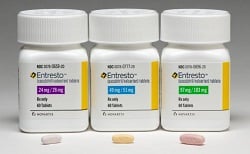When Novartis ($NVS) execs predicted big things for their Entresto launch, they didn't promise it would happen overnight. But now, they admit the heart failure drug has lagged their own internal expectations. And according to one analyst who's surveyed doctors about the med, its climb to blockbuster sales may be steeper than anyone anticipated.
 Earlier this year, executives laid out a couple of problems: slow negotiations for formulary access and prior authorization hurdles between patients and their prescriptions. But according to Leerink Partners analyst Seamus Fernandez, Entresto faces other obstacles to uptake--and those obstacles make his firm's current $6 billion peak-sales forecast for the drug "unrealistic."
Earlier this year, executives laid out a couple of problems: slow negotiations for formulary access and prior authorization hurdles between patients and their prescriptions. But according to Leerink Partners analyst Seamus Fernandez, Entresto faces other obstacles to uptake--and those obstacles make his firm's current $6 billion peak-sales forecast for the drug "unrealistic."
Citing a survey of heart failure doctors and conversations with experts in the field, Fernandez says doctors are reluctant to switch patients who are stable on older therapies, and they're particularly skeptical about using Entresto in patients who are unstable or symptomatic because of "limited efficacy data" in that group.
Plus, some docs have seen higher rates of low blood pressure problems in the real world than in clinical trials, Fernandez wrote in a Wednesday note to investors. And they see dose titration as "problematic."
"As we see it, the biggest challenges to clinical adoption are reluctance to switch the group of stable patients as well as titration and hypotension issues," Fernandez said.
Now, Leerink pegs Entresto with $2.6 billion in 2026 sales, down from $6.8 billion. The firm's best-case scenario puts sales at $5.25 billion--not too shabby--but on the worst-case end of things, it's $800 million.
Entresto came to market armed with some outcomes data that seemed a solid sell: It beat one standard treatment at keeping heart failure patients out of the hospital, saving money on expensive stays. Novartis got to work with payers on reimbursement deals, aiming, with some, to break new ground with performance-based payments.
Reimbursement deals didn't come quickly--Medicare Part D coverage, in particular, was lagging because plans legally have 6 months to decide--but the company promised in January that the coverage talks were wrapping up.
There's some hope ahead with new heart failure treatment guidelines from the American College of Cardiology Foundation and the American Heart Association, due later this year. Payers rely on those guidelines in making coverage decisions, and backing from those groups could help lower some reimbursement hurdles.
But as Novartis pharma chief David Epstein said during the company's Q4 earnings call, any boost from new guidelines depends on the details. "We do not yet know how the products will be positioned, whether it will be a choice, whether it would be Entresto first or there will be some other caveats," he said. "Remember, there is only one pivotal trial for doctors who will tend to be more cautious when they write those initial guidelines."
Canadian guidelines recently put Entresto into the treatment mix as a second-line therapy, and the U.S. groups aren't likely to give across-the-board backing to Entresto, Fernandez figures. "We expect the update to drive Entresto adoption by raising awareness and improving payer hurdles, but with clinical and cost barriers still present," he wrote.
Novartis could turn things around, and a couple of performance-based deals with payers might help. Cigna and Aetna, which announced their pay-for-results deals last month, will get rebates from Novartis based on how well Entresto works. If the drug saves on hospitalizations or other costs, rebates go down; if not, they go up. Real-world proof that Entresto is worth any difficulties--with starting therapy, monitoring blood pressure and so on--might make skeptical doctors less so.
Meanwhile, Novartis has retrained its Entresto sales reps to better handle any reimbursement hurdles, and is in the process of expanding its field force to put more cardiologists on its call list. And for what it's worth, Epstein pointed out in January that early uptake in Switzerland and Germany has been strong--in Switzerland, five times as strong as in the U.S.
- read the Q4 call transcript at Seeking Alpha
Special Report: The 25 most influential people in biopharma in 2015 - David Epstein - Novartis